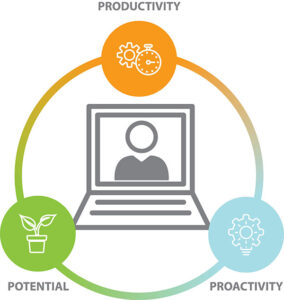When we sat down to write The Long-Distance Teammate, we set out to answer one critical question: What are the behaviors that separate solid individual contributors from people who are true teammates? Specifically, they want to do what, besides having a “good attitude,” do they actually DO that separates them from others?
We discovered three core components to being an engaged, successful teammate. The three words that best sum those up are: Productivity, Proactivity, and Potential. Thus we termed this the “3P Model.”

How do these components tie to being a great teammate? We’re glad you asked.
Productivity: This is often the first (and sometimes only) thing people immediately think of when they picture a successful remote worker. Are they getting the right work done in the right way in a timely manner? This involves eliminating distractions, keeping your work priorities straight, and meeting deadlines, often by motivating yourself when no one else is around to help. All things that successful individual contributors do.
When we work remotely this is often our focus, and can lead to long-term negative behaviors such as working too many hours in a day and neglecting work-life balance, and focusing on our own personal tasks and metrics at the expense of collaboration with the team. Over time people can become disengaged, stressed and burned out.
Productivity is not just getting the work done, it’s getting the right work (the correct mix of personal and team work) done in the right way (following team processes, maximizing the technology, managing time to allow for a life.)
Proactivity: In dozens of interviews with successful remote workers and their managers, one word came up more than any other: proactivity. Even for individual workers, being proactive is important” if you see something needs to be done, do it without waiting to be asked. But great teammates are proactive in other, less obvious ways.
They offer assistance to peers without being asked. Remote workers often have questions about their work, but a good teammate has built the kind of relationships that allow them to ask questions without being prompted, because they have intentionally built trust. Proactive teammates take ownership of meetings, adding value by contributing and paying attention in meetings, while helping keep them productive and on task. Most importantly, they are intentional about maintaining contact with their teammates and keeping working relationships strong, rather than creating silos that might be personally productive but don’t help the rest of their team in the long run.
Potential: Perhaps the most corrosive part of remote work is that work becomes transactional. Team members only reach out to coworkers when they need something or get asked a question. they might be so focused so intently on completing a particular personal task that they tune out on meetings, or keep conversations short and focused, rather than have the kind of relationship-building conversations they had in the office.
More importantly, while working from home allows them to avoid “office politics,” and “stick to the work,” remote workers often miss out on valuable information, networking, and career enhancement possibilities. While focusing on the current work is important, it is hard to stay engaged over a long period if there aren’t sufficient rewards and recognition for all their hard work. They don’t enjoy their job and the people they work with, and often don’t make the day to day work fit the larger plan for their lives. This can leave them disengaged, unsatisfied, and life.
By being “ethically visible,” remote teammates can help their team, raise their own visibility in a positive, productive way, and keep the bigger picture in mind (and in perspective.)
The 3P Model is a key component of The Long-Distance Teammate-Stay Engaged and Connected Working Anywhere. By keeping its components in mind, remote workers can be mindful about the behaviors that separate a good individual team member, from a true teammate.
Kevin Eikenberry is a recognized world expert on leadership development and leader of The Kevin Eikenberry Group. He has twice been named by Inc.com as one of the top 100 Leadership/Management Experts in the World. He is the author, co-author or a contributing author to 20 books, including the latest collaboration with Wayne Turmel, The Long-Distance Teammate: Stay Engaged and Connected While Working Anywhere.
Wayne Turmel is the co-founder and Product Line Manager for the Remote Leadership Institute and is the author of several books that demystify communicating through technology. Wayne and Kevin teamed up previously for The Long-Distance Leader: Rules for Remarkable Remote Leadership.

